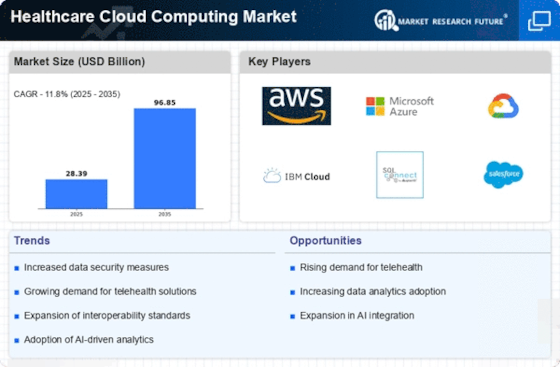Market Trends
Key Emerging Trends in the Healthcare Cloud Computing Market
The Healthcare Cloud Computing market is experiencing a surge in adoption as healthcare organizations worldwide transition from traditional on-premises systems to cloud-based solutions. This shift is caused by the need to increase scalability, flexibility and cost-effectiveness in managing health care information. One of the significant patterns in healthcare cloud computing is centralization of EHR to the cloud. This makes it possible for the health care providers to access patient information in a safe state remotely hence enhancing effective collaboration and continuity of treatment. Since healthcare systems become more and more complicated, interoperability forms a new trend. Cloud computing solutions are becoming more refined to allow smooth data transmission and integration among various healthcare systems, supporting care coordination with information sharing. In line with the sensitivity of healthcare data, cloud computing solutions are increasingly focusing on security features. Sophisticated encryption, as well as multi-factor authentication and conformity to healthcare legislation like HIPAA become common characteristics in order to preserve the privacy and data integrity of patient details. Telehealth services and remote patient monitoring have been adopted at a faster rate due to the pandemic caused by COVID-19. Cloud computing is a vital part of these services as it offered the infrastructure needed for virtual consultations, remote diagnostics and real-time monitoring of patients’ health data. With the aid of cloud computing, healthcare organizations are able to utilize AI and Machine Learning methods for data sensing, forecast analytics as well as individualized medication. This phenomenon is leading to better diagnostics, treatment planning and healthcare decision making. Hybrid cloud comprised of public and private infrastructure is preferred by many healthcare organizations. This method strikes a balance between security and versatility as organizations can keep confidential data on premise while enjoying the benefits of public cloud like scalability, cooperation etc. As an alternative to the expensive traditional IT infrastructure, cloud computing is a cost-effective approach. Healthcare providers can lower their capital costs, adjust resources as required and increase efficiency in IT spending. This financial freedom has especially appealed to organisations with funding limitations. Cloud computing represents a key element of the population health management strategies implementation. Healthcare cloud computing is embracing the model of distributed processing called edge computation. This methodology allows real-time processing of data at the edge, minimizing latency and improving applications such as remote patient monitoring or wearable health intelligence. Cloud computing promotes full data analytics in the field of medicine. Big data analytics, real-time reporting and other techniques enable derived insights from huge datasets that facilitate evidence based decision making for better outcomes in patients as well operational efficiency. The healthcare cloud computing market is witnessing increased collaborations and partnerships between cloud service providers and healthcare technology vendors. This trend aims to create integrated solutions that address specific healthcare challenges, fostering innovation and the development of specialized applications.


















Leave a Comment